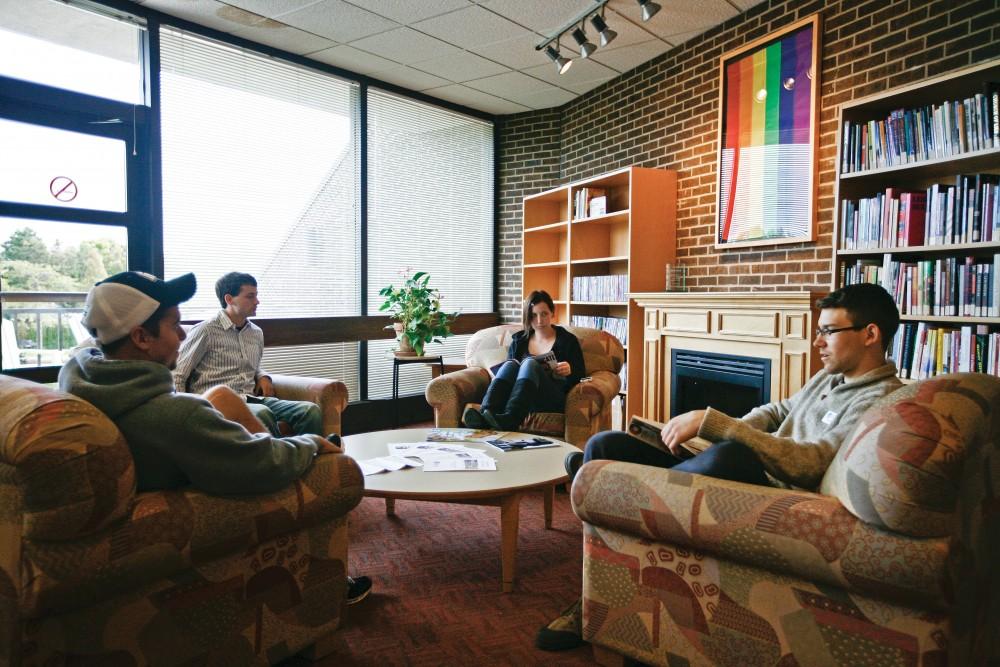Supreme Court to review same-sex marriage ban

GVL / Eric Coulter Students utilize the common area in the LGBT Resource Center
Feb 12, 2015
On Jan. 16, the United States Supreme Court made the decision review the 6th Circuit Court of Appeals’ order upholding the same-sex marriage ban. Michigan, as part of the 6th Circuit, is one of 14 remaining states to ban same-sex marriage. In looking at this ruling, the Supreme Court will question the following:
- Whether the 14th Amendment requires states to license same-sex marriages and,
- Whether the 14th Amendment requires states to recognize same-sex marriages that were lawfully performed in other states.
The case will be presented in part to the Supreme Court by Fauver Law Office law firm, which has recently hired GVSU Legal Studies graduate Megan Williams.
“I’m so excited to be a part of the firm that is working on behalf of this issue,” Williams said. “It is such an important issue to so many at Grand Valley.”
At the Milton E. Ford LGBT Resource Center, members of the LGBT community gathered together to discuss the ramifications of this decision. Students Max Granitz, Asia Smith, Brae Morris, Ashlyn Rowell and others spoke of their hope that the Supreme Court would rule against the marriage ban.
Max Granitz said this issue should not only be addressed at a state level, but nationally. Although he does not plan to remain in Michigan himself, he hopes there will soon be an option for friends and family to get married here.
“Above anything else, I just want to see my best friend able to get married,” Granitz said.
Smith spoke of what it would mean for the community if the ban was lifted, focusing on how it would help society move toward acceptance of the LGBT community.
“I will be able to get married, my friends will be able to get married,” Smith said. “My whole community will be able to get married. We will finally be recognized as equals.”
Morris agreed that the removal of the ban would make her feel more accepted.
“I will feel equal to everybody instead of feeling like I’m an outcast,” she said.
The students recognized the possibility that the Supreme Court will uphold the decision of the 6th Circuit Court of Appeals. Rowell said this would mean gay people would become second class citizens.
“Marriage isn’t just about affirming your love for someone, it’s also about growing in your relationship, receiving benefits and raising children,” she said. “Gay people are people, and when you deny us marriage, you demean us to a lesser status.”
Emily West, LGBT coordinator, said the LGBT community would not give up – regardless of the outcome in court.
“There is a statewide organization called Equality Michigan,” she said. “They’re working on a lot of different strategies to get marriage equality in Michigan; they have been working on this for decades and are not going to stop now.”
Although many agree that the case should be reviewed by the Supreme Court, Benjamin Soltis, executive committee member of the Jackson County Republican Party, believes that such a decision should be left to the voters of this state.
“Marriage has been defined our state constitution and in US law by voters and their representatives from both parties,” he said. “I would encourage further discussion on such a change instead of a swift decision by unelected judges.”
The students also discussed the recent decision by lawmakers not to appeal a federal injunction requiring the state to recognize marriages that took place on March 22.
Rick Snyder announced this decision on Feb. 4 and explained that the decision was made because a judge had legally allowed individuals to be married that day, and as such, the marriages should be recognized and benefits should be extended to the couples.
Max Grantiz expressed his delight at this outcome.
“I’m thrilled that the weddings that took place are now going to be respected by the state,” he said. “I’m surprised the governor let it happen; I just hope it lasts.”
The Supreme Court plans to have a final ruling on the gay marriage ban by June. Until then, those who will be most affected by the decision can only wait.
“We are legally allowed to die for our country,” Rowell said. “We can legally vote. We should legally be allowed to be together with the people that we love.”

























